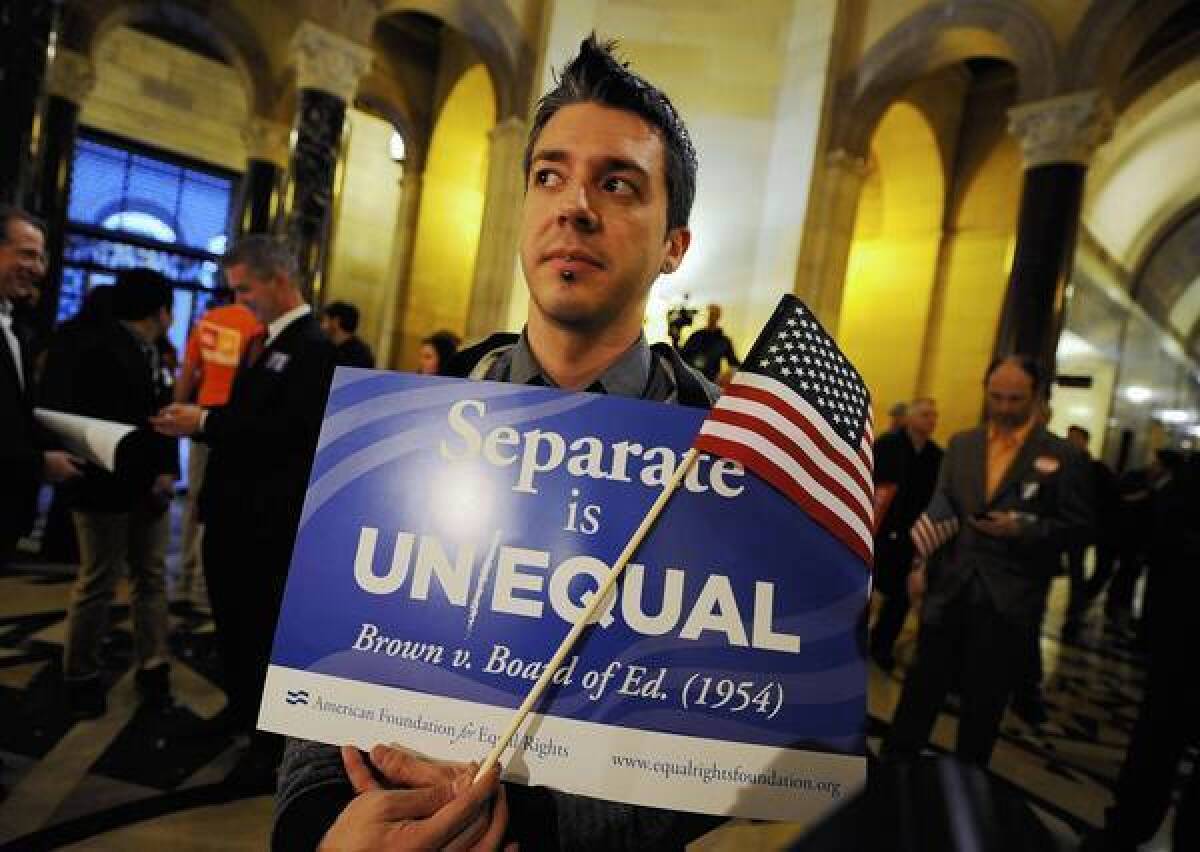Supreme Court is urged to allow gay marriage nationwide

WASHINGTON — The lawyers challenging California’s Proposition 8 urged the U.S. Supreme Court on Thursday to rule that gays and lesbians across the nation deserve an equal right to marry, ratcheting up the pressure on the Obama administration and the justices.
Rather than seek a narrow win based on the special situation in California, the legal brief argues that marriage should be available as a constitutional right to all loving and committed couples.
“We believe this is a matter of fundamental rights,” said Washington attorney Ted Olson shortly after filing his legal brief with the high court.
Next week, the Obama administration must decide whether to take part in the California case by filing a “friend of the court” brief.
“The solicitor general is still looking into this,” President Obama said Wednesday in an interview with a San Francisco TV station. “I can tell you, though, obviously my personal view, which is that same-sex couples should have the same rights and be treated like everybody else.”
Olson and co-counsel David Boies said they decided to “paint the broad picture” for the Supreme Court on how marriage for gays fits with the nation’s historic commitment to liberty and equality.
“Because of their sexual orientation — a characteristic with which they are born and which they cannot change — plaintiffs and hundreds of thousands of gay men and lesbians in California and across the nation are being excluded from one of life’s most precious relationships. They may not marry the person they love, the person with whom they wish to partner in building a family and with whom they wish to share their future,” they wrote.
Forbidding them to marry “denies gay men and lesbians their identity and their dignity; it labels their families as second-rate. That outcome cannot be squared with the principle of equality and the unalienable right to liberty and the pursuit of happiness that is the bedrock promise of America from the Declaration of Independence to the 14th Amendment and the dream of all Americans.”
Last year, the U.S. 9th Circuit Court of Appeals struck down Proposition 8 as unconstitutional, but did so for a reason unique to California: In 2008, voters adopted a state constitutional measure limiting marriage to a man and a woman in order to overturn a state Supreme Court ruling permitting gay marriage. The appeals court said it was unconstitutional for a state or its voters to take away such a fundamental right.
If the U.S. Supreme Court were to follow this approach, it would void Proposition 8 and permit gay marriage in California, but its ruling would not affect other states.
Nine states permit marriage for same-sex couples.
Olson and Boies also argue that the ban on same-sex marriages hurts children. “There are nearly 40,000 children living in California households of gays and lesbians. This is about their rights, their equality and their families,” Olson said.
If the high court wants to avoid a broad ruling, Olson offered one exit ramp. He said the proponents of Proposition 8 are not the state of California and have no standing to appeal. If the justices agree, they could let stand the judge’s original ruling in favor of the gay couples who sued.
The lawyers defending Proposition 8 argued that because there is a great national debate over gay marriage, the justices should step aside and allow voters and lawmakers to resolve the issue state by state.
Besides the California case, the Supreme Court will hear a challenge next month to the Defense of Marriage Act, the federal law that forbids federal agencies from recognizing same-sex marriages. The Obama administration is due to file its brief Friday arguing that the law’s ban on benefits for legally married gay couples violates the Constitution’s guarantee of equal protection of the laws.
Olson said he would welcome support from the administration in the California case as well. “We would very much like the United States to file a brief as a friend of the court,” said Olson, who served as U.S. solicitor general under President George W. Bush.
The deadline for filing an amicus brief in the case is Feb. 28.
More to Read
Sign up for Essential California
The most important California stories and recommendations in your inbox every morning.
You may occasionally receive promotional content from the Los Angeles Times.











